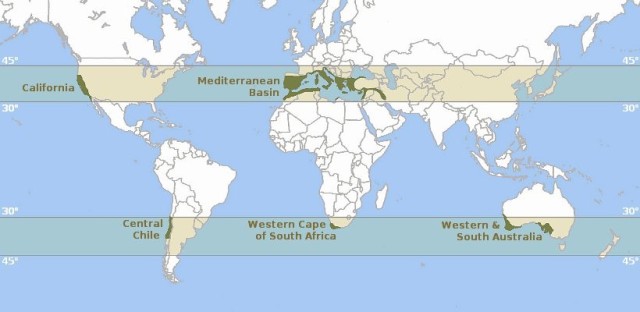By Jay Lund.
California’s combination of climate, native ecosystems, and human uses makes water management inherently hard, unsatisfactory, and evolving. California is doomed to have difficult and controversial water problems. No matter how successful we are.
California is one of the few parts of the world with a Mediterranean climate (Figure 1). These climates tend to be dry (not much water), attractive places to live and farm (bringing high water demands), with mismatch between wetter winters and dry summer growing seasons. The scarce water supply in the wrong season for human activities makes human management of water problematic for native ecosystems.

Figure 1. Mediterranean climates of the world
Mediterranean climates are special places, socially, economically, and environmentally with unavoidably challenging water problems.
California’s ongoing drought has provided opportunities to scrutinize its water management. Droughts are trials that help identify problems and solutions. The current drought has prompted several water management innovations in California, including state efforts to require local groundwater management, tightening water rights administration, and increases in water prices and urban water conservation. Every drought is different, affecting a somewhat changed water system which serves a changing society, economy, and ecosystem. Droughts historically catalyze strategic changes in California’s water management system.
If California is doomed to have hard water problems and unsatisfactory water solutions, how is California doing relative to other parts of the world blessed and burdened with Mediterranean climates. Table 1 roughly compares the world’s regions with Mediterranean climates in terms of the population they support, economic wealth per capita, size of their agricultural economy, and (very roughly) condition of their native freshwater aquatic ecosystems.
As a person, native fish, or farmer, in which Mediterranean climate would you rather live?
Table 1. Comparison of Water Management Success for the World’s Mediterranean Climates (Population and economic data from Wikipedia.com. Agricultural economy data from FAO Statistical Pocketbook 2015. Ecosystem assessment is purely subjective.)
| Country/ State | Population (millions) | Wealth (GDP PPP/person) | Food Production ($ billion) | Native Freshwater Aquatic Ecosystem Condition |
| California | 39 | $62,000 | $45 | Struggling, much diminished |
| Algeria | 39 | $13,000 | $8 | Largely eliminated |
| Australia | 24 | $68,000 | $25 | Substantially eliminated |
| Chile | 18 | $22,500 | $8 | Substantially eliminated |
| Greece | 11 | $26,000 | $6 | Largely eliminated |
| Israel | 8 | $36,000 | $3 | Largely eliminated |
| Italy | 61 | $35,600 | $29 | Largely eliminated |
| Morocco | 33 | $7,000 | $9 | Largely eliminated |
| S. Africa | 54 | $12,500 | $13 | Struggling, much diminished |
| Spain | 46 | $43,000 | $32 | Largely eliminated |
California is perhaps the world’s best-performing region with a Mediterranean climate in terms of managing water for both humans and ecosystems. California can learn from other regions, but is certainly not a laggard in terms of environmental and economic performance among Mediterranean climates. We do not do as well with water as we would like, and we must find ways to do better, but California nevertheless does relatively well in managing water.
This is not to encourage complacence, but to discourage panic. There seems little reason to support an overall revolution in most of California water management, despite ongoing needs to make substantial improvements. California always will need to pay attention to making improvements in how water is managed, to reduce the inherent dissatisfactions of a populous, prosperous, and agriculturally productive region with a dry Mediterranean climate. Organized and persistent attention with high but realistic expectations has been key to California’s historical success and to continued change and progress.
[divider] [/divider]





